|
|
|
Sort Order |
|
|
|
Items / Page
|
|
|
|
|
|
|
| Srl | Item |
| 1 |
ID:
115071
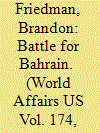

|
|
|
|
|
| Publication |
2012.
|
| Summary/Abstract |
After the popular uprisings that struck in Tunisia, Egypt, Libya, Bahrain, Yemen, and Syria, the surviving Middle East monarchies have come under heavy criticism in the West. Many believe it is only a matter of time until they are next. The conventional wisdom in the West is that this revolutionary change in the Middle East must be a positive thing. Popular demands for political freedom are viewed as part of the inevitable march of progress. Another implicit assumption in the West is that the monarchies, like the corrupt autocrats who have fallen, lack popular support.
|
|
|
|
|
|
|
|
|
|
|
|
|
|
|
|
| 2 |
ID:
151846
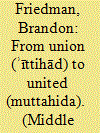

|
|
|
|
|
| Summary/Abstract |
The United Arab Emirates (UAE) was the result of more than three years of failed negotiations to unify the nine pre-state shaykhdoms. Thus, the formation of the UAE may be viewed as a success born of failure. In the period following the 1968 British announcement, the political events that led to the formation of the modern state of the UAE were largely a product of the competition for power or protection between the rulers of the nine pre-state shaykhdoms. This article explains how the personal rivalries and historical animosities between the ruling shaykhs manifested themselves and shaped events that led to the formation of the UAE in 1971.
|
|
|
|
|
|
|
|
|
|
|
|
|
|
|
|
| 3 |
ID:
162746
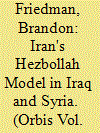

|
|
|
|
|
| Summary/Abstract |
This essay argues the wars in Iraq and Syria are not over. Iran has used the war against the Islamic State, and, more generally, the instability in Iraq and Syria, to successfully spread and legitimize its influence. If the U.S. intends to challenge Iran's influence in Syria and Iraq, it needs to demonstrate its long-term commitment to its local partners, and it needs to work with its partners to secure and stabilize eastern Syria and western Iraq. Countering Iran's influence in Iraq and Syria is a long-term project, and creating viable alternatives to Iranian influence in Damascus and Baghdad is the best way to prevent them from becoming long-term Iranian dependencies.
|
|
|
|
|
|
|
|
|
|
|
|
|
|
|
|
| 4 |
ID:
192580
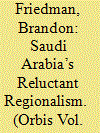

|
|
|
|
|
| Summary/Abstract |
Saudi Arabia’s turn to regionalism during the past three years, principally in partnership with Egypt, is an expression of both its weakness and its power. Its role as the world’s swing producer in the global oil markets makes it an international power. This economic power, in turn, has allowed the Kingdom to help stabilize weaker economies in the region, like Egypt, that have been hard hit by global recession, inflation, and food insecurity. On the other hand, its military failure in Yemen and the US’s attenuating security commitment have forced it to build regional and inter-regional partnerships for protection and defense. Under the leadership of Crown Prince Mohammed bin Salman (MbS), Saudi Arabia would prefer to impose its will on the region without having to build a regional consensus for its initiatives. But its lack of independent military power has constrained the Kingdom. The Saudi-Egyptian partnership therefore represents a mutual recognition of the limits of their respective power. It also raises the question not merely about who leads whom, but whether the carefully cultivated interdependency between them will hold.
|
|
|
|
|
|
|
|
|
|
|
|
|
|
|
|
| 5 |
ID:
155278
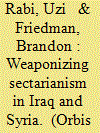

|
|
|
|
|
| Summary/Abstract |
The last six years of insurgency, rebellion, and war have eroded territorial state sovereignty in Iraq and Syria. The scale and savagery of the war have transformed Sunni-Shia sectarianism into a zero-sum politics of survival. In other words, residents of Iraq and Syria have been forced to choose between Sunnis and Shia in order to survive. This essay explains how the diverging interests of foreign actors—Iran, the Islamic State and other Salafi-Jihadi foreign fighters, Russia, Saudi Arabia, Turkey, and the United States—prolonged the war, providing the time and space for the belligerents in Iraq and Syria to weaponize sectarianism.
|
|
|
|
|
|
|
|
|
|
|
|
|
|
|
|
|
|
|
|
|